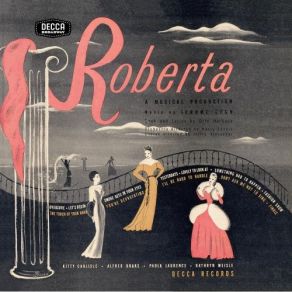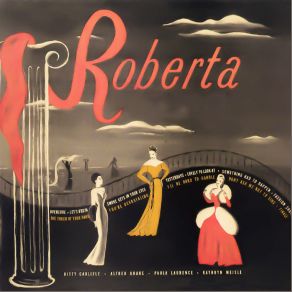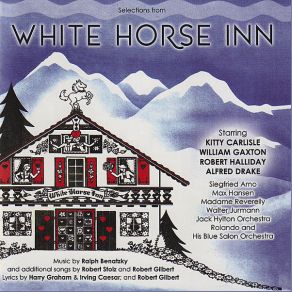Kitty Carlisle
Wikimp3 information about the music of Kitty Carlisle. On our website we have 2 albums and 6 collections of artist Kitty Carlisle. You can find useful information and download songs of this artist. We also know that Kitty Carlisle represents Theatre/Soundtrack genres.
Biography
[Edit]Kitty Carlisle had several different careers: actress, singer, game-show panelist, government official. But in a sense, her greatest attributes, which she brought to each of these professions, were her charm and sophistication. She gave the impression of being a wealthy, cultured person who just happened to be performing on-stage or chatting on television. That impression was created by a background of associating herself with people who actually were wealthy and cultured, so that she in effect eventually became one of them herself. Among her accomplishments, she was a trained soprano who performed in musicals, operettas, and, occasionally, operas, and her limited discography includes four notable cast recordings. But that was only one of her many activities over a 75-year career.
Carlisle was born Catherine Conn in New Orleans, LA, on September 3, 1910. (Most biographical references incorrectly list 1914 as the year of her birth; Carlisle herself has said that she has lied about her age so often she doesn't remember anymore. But the dates and ages cited over the course of her 1988 autobiography, Kitty, confirm the 1910 date.) Her father was Dr. Joseph Conn, a gynecologist; her mother, Hortense (Holtzman) Conn, the daughter of the first Jewish mayor of Shreveport, LA, was an amateur violinist. As a child, Carlisle began piano lessons with her mother, then with teachers. Her life was drastically altered by the death of her father when she was ten. Shortly after, her mother took the resulting life insurance payment, sold the family house, and moved the two of them to Europe. Socially aspirant, Hortense Conn planned to give her daughter an upbringing that would prepare her to marry into wealth. She financed the necessary lifestyle with a succession of suitors and speculation in the booming stock market of the 1920s. She enrolled her daughter at an elite Swiss school, the École Mont Choisi in Lausanne, in the fall of 1922 and Carlisle spent two years there. Because there were so many Catherines at the school, she agreed to adopt the nickname "Kitty." In 1924, she moved with her mother to Paris and continued her formal education another year, then took piano and singing lessons, and later went to a finishing school. She had not yet fulfilled her mother's desire that she find a rich husband when the stock market crash of 1929 wiped out the family's finances. With that, the two decided that Carlisle should turn to the stage for a career, and she enrolled at the Royal Academy of Dramatic Arts in London, where she won a certificate. But, as a foreigner, she was unable to get acting jobs in England, and her mother's latest suitor (who would remain with her the rest of her life) was a New York lawyer, so mother and daughter moved to New York in 1932 after a decade abroad.
In New York, Kitty Conn became Kitty Carlisle, a name she picked out of a phone book. Auditioning for stage work, she was first hired to appear in a "tab" (or truncated touring) version of the 1927 Broadway musical Rio Rita that played in movie houses around the country for eight months. Returning to New York, she was cast in the Broadway operetta Champagne, Sec, an English-language adaptation of the Viennese operetta Die Fledermaus that opened October 14, 1933. It ran for 113 performances, until January 20, 1934, and while she was in it, Carlisle was seen by Hollywood talent scouts. This led to a contract with Paramount Pictures and a move to Los Angeles. Her first film was Murder at the Vanities, released in May 1934, in which she sang "Cocktails for Two." Then, she co-starred with Bing Crosby in She Loves Me Not, released in September, in which she sang "Love in Bloom." Crosby was her co-star a second time in Here Is My Heart, released in December, and in it they sang "June in January." For her next film, she was loaned out to MGM and played an opera singer in the Marx Brothers comedy A Night at the Opera, released in December 1935, singing "Alone" with Allan Jones. But the loan-out and the long lag between films indicated that Paramount did not have further plans for her, and the studio paid her off and canceled her contract.
Carlisle returned to New York, where she worked in radio. She was next cast in the Broadway musical White Horse Inn, an operetta that had originated in Germany and already been a hit around the world. It opened October 1, 1936, and ran 223 performances, closing April 10, 1937. On December 25, 1937, she opened in Three Waltzes, another adaptation of a European operetta come to Broadway, this one based on the Swiss work Drei Walzer with music adapted from Johann and Oscar Strauss. It ran 122 performances, closing on April 8, 1938. Carlisle went back to singing on radio and acting in summer stock. She returned to Broadway in the musical Walk with Music, with songs by Hoagy Carmichael and Johnny Mercer. It opened June 4, 1940, but closed after only 44 performances on July 20.
With no other offers for films or musicals, Carlisle put together a nightclub act and began playing engagements in major cities. In 1943, she performed in a production of Franz Lehár's 1905 operetta The Merry Widow at the Boston Opera House. Knowing of Decca Records president Jack Kapp's interest in the musical theater, she sent the favorable reviews of the show to him, and in 1944 Kapp assembled a studio-cast recording of The Merry Widow with her and also featuring Wilbur Evans of the same Boston production and Lisette Verea, who had appeared in a 1944 New York production. Kapp signed Carlisle to Decca, and she recorded a series of singles for the label. She also appeared on Decca studio-cast albums of the 1933 Jerome Kern musical Roberta and the 1926 Sigmund Romberg operetta The Desert Song, and when a contractual conflict prevented Irra Petina, the star of the 1944 Broadway musical Song of Norway, from appearing on the Decca cast album, Carlisle stepped in and substituted for her.
Meanwhile, she made two more film appearances, acting in the B-picture Larceny with Music, released in September 1943, and making a guest appearance in the all-star Hollywood Canteen in December 1944. But nightclub work remained her main occupation. On August 10, 1946, she married playwright and director Moss Hart, after which she pursued her career on a part-time basis. She gave birth to a son, Christopher Hart, on January 14, 1948. Later that year, she was cast in a Broadway production of the Benjamin Britten opera The Rape of Lucretia, which opened a limited engagement on December 29, 1948, and ran 23 performances, closing on January 16, 1949. In June 1950, she gave birth to a daughter, Catherine Carlisle Hart. She continued to make occasional appearances in summer-stock productions. In 1954, she returned to Broadway in her only non-singing appearance in a straight play, Anniversary Waltz, directed by her husband. The play opened April 7, 1954, and ran a successful 615 performances. She had her last Broadway credit in 1956, appearing in a City Center revival of Kiss Me, Kate, which opened a limited engagement on May 9 and ran 23 performances through May 27.
Carlisle's wit and charm had early on made her an ideal panelist on radio, and later, television game shows. On radio, she had been a regular on a program called So You Think You Know. On television, she served on panels for Who Said That?, I've Got a Secret (1952-1953), and What's Going On? (1954). But she found long-lasting fame on To Tell the Truth, a show on which celebrity panelists attempted to guess the identity of a notable person appearing beside a couple of imposters. The show premiered on December 18, 1956, and Carlisle joined it in 1957. It ran on network television another ten years, until 1967, and went into syndication in 1969, remaining on the air until 1977. Carlisle was a regular for those 20 years, and she achieved a level of fame in connection with it that eclipsed any of her earlier work.
Moss Hart died of a heart attack on December 21, 1961. Carlisle, in addition to her regular appearances on To Tell the Truth, continued to make occasional special appearances, particularly in small roles in opera. Recalling her Broadway debut in Champagne, Sec decades earlier, she repeated her role as Prince Orlovsky in Die Fledermaus, the opera on which it was based, at the Metropolitan Opera in 1967, then had another small role in Donizetti's The Daughter of the Regiment in Boston. In the early '70s, she was appointed by Governor Nelson Rockefeller as vice chairman of the New York State Council on the Arts, a state equivalent of the National Endowment for the Arts charged with distributing government grants to artists and arts institutions. In 1976, she became chairman of the council and continued to serve until January 1996. She also continued to practice her singing, and she remained in sufficiently good voice to appear as a replacement cast member in the 1983 Broadway revival of the musical On Your Toes and to perform "They're Either Too Young or Too Old" in the 1987 Woody Allen film Radio Days. She followed this with a small part in the 1993 film Six Degrees of Separation. She continued to make occasional appearances at benefits, in nightclubs (with a show she called, "My Life on the Wicked Stage"), and even on cruise ships, well into her nineties. In 2004, she appeared in an off-Broadway revue, Tasting Memories. Her final nightclub engagement was at Feinstein's at the Regency in New York City in September 2006 and featured her reminiscences about George Gershwin, Jerome Kern, and other Broadway composers she had known. She died of heart failure on April 17, 2007, in Manhattan at the age of 96.
Collections
Title: Roberta (Original Musical Recording)
Genre: Theatre/Soundtrack
Title: White Horse Inn
Genre: Rock, Theatre/Soundtrack
Title: Les congés payés / Les conges payes
Genre: Pop
Title: Early Film Recordings (1928-1936)
Genre: Theatre/Soundtrack
Title: The Desert Song / New Moon (Remastered)
Genre: Theatre/Soundtrack
Featuring albums
Title: The Marx Brothers Strike Again! Vol.1
Artist: The Marx Brothers
Genre: Theatre/Soundtrack, Humor
Title: Song of Norway (1945 Original Cast Recording)
Artist: Song Of Norway
Genre: Theatre/Soundtrack
Title: Song of Norway (1945 Original Cast Recording)
Artist: Various Artists
Genre: Theatre/Soundtrack, Vocal & Symphonic













